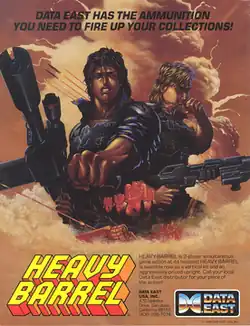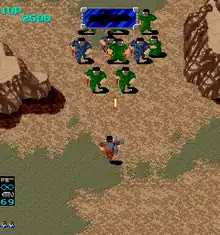Heavy Barrel
Heavy Barrel[lower-alpha 1] is a 1987 overhead run and gun arcade game by Data East.
| Heavy Barrel | |
|---|---|
 U.S. arcade flyer of Heavy Barrel. | |
| Developer(s) |
|
| Publisher(s) | Data East |
| Designer(s) | Koji Akibayashi (game design)[1] Junichi Watanabe, Kenichi Fujimoto, Hiroyuki Iwabe (hardware) |
| Programmer(s) | Men Taiko Nobusuke Sasaki Naomi Susa Satoshi Imamura Toshinari Ueda |
| Artist(s) | Jun Sato Back Man Masanori Tokoro Tomo Adachi Yoshiyuki Urushibara Mix Man |
| Composer(s) | Azusa Hara[1] Hiroaki Yoshida[1] |
| Platform(s) | |
| Release | 1987 |
| Genre(s) | Run and gun |
| Mode(s) | Single player, Cooperative |
Gameplay

Terrorists have seized the underground control complex of a nuclear missile site, and it is up to the player to infiltrate the base and kill the enemy leader. Players begin armed with a gun with unlimited ammunition and a limited supply of grenades. Improved weapons and grenade powerups are made available within the game, either in plain sight or within crates that must be unlocked using keys. Additionally, crates may contain orbs or one of the six pieces of the Heavy Barrel superweapon. Like SNK's Ikari Warriors, the original arcade version featured 8-way rotary joysticks.
The name of the game is from an in-game weapon. The Heavy Barrel is found in six pieces and is an energy cannon capable of destroying any enemy in the game with a single shot (except the final enemy, and possibly one other boss that may have required two shots). The weapon has a wide arc of fire and can be fired as fast as the player's trigger finger permits, but after thirty seconds its use is exhausted, at which point the bearer reverts to his previous weaponry. The Heavy Barrel is best used to get past tough bosses, and the game only contains enough pieces to allow the weapon to be built three times in a single game.[2] In a two-player game, whoever collects the sixth piece is equipped with the Heavy Barrel.
Ports
- Heavy Barrel was ported by Quicksilver Software to the Apple II and DOS in 1989.[3][4] The NES port was developed by Data East and released in North America and Japan in 1990. All versions of Heavy Barrel were published by Data East.
- In 1989, Heavy Barrel was contracted to be ported to the Commodore 64 by F.A.C.S. (Financial Accounting and Computing Software), a West Bloomfield Township, Michigan company. The graphics engine and much of the game-play was in place, but the development company folded before the project could be finished.
- In February 2010, Majesco Entertainment released[5] a port of Heavy Barrel for the Wii (as part of the Data East Arcade Classics disc) and for the Zeebo.
Reception
| Publication | Score |
|---|---|
| AllGame | (Arcade) (NES) |
| Electronic Gaming Monthly | (NES) 28/40[8] |
| Pure Nintendo Magazine | (Switch) 6/10[9] |
| Video Chums | (Switch) |
In Japan, Game Machine listed Heavy Barrel on their January 15, 1988 issue as being the sixth most-successful table arcade unit of the month.[11] Both Computer and Video Games's Clare Edgeley and ACE's Andy Smith gave an overall positive outlook to the arcade original.[12][13]
References
- Closing credits of Heavy Barrel (arcade version)
- "Heavy Barrel, Arcade Video game by Data East (1987)".
- "Heavy Barrel (1987)".
- "Heavy Barrel for DOS (1989) - MobyGames".
- Majesco press release Archived 2012-03-13 at the Wayback Machine, 16 February 2010
- Schwartz, Michael; Dykman, Joan (1998). "Heavy Barrel (Arcade) - Overview". AllGame. All Media Network. Archived from the original on 2014-11-14. Retrieved 2020-07-27.
- Miller, Skyler (1998). "Heavy Barrel (Nintendo Entertainment System) - Review". AllGame. All Media Network. Archived from the original on 2014-11-16. Retrieved 2020-07-27.
- Harris, Steve; Semrad, Ed; Alessi, Martin; Stockhausen, Jim (May 1990). "Review Crew: NES - Data East — Heavy Barrel". Electronic Gaming Monthly. No. 10. Sendai Publishing. p. 18.
- Hiner, Kirk (December 5, 2018). "Review: Johnny Turbo's Arcade: Heavy Barrel (Nintendo Switch)". Pure Nintendo Magazine. Pure Media, LLC. Retrieved 2020-07-27.
- Maciejewski, A.J. (May 18, 2020). "Johnny Turbo's Arcade Games - 10 Data East classics on Switch: Heavy Barrel Review". videochums.com. Video Chums. Retrieved 2020-07-27.
- "Game Machine's Best Hit Games 25 - テーブル型TVゲーム機 (Table Videos)". Game Machine (in Japanese). No. 324. Amusement Press, Inc. 15 January 1988. p. 21.
- Edgeley, Clare (April 1988). "Arcade Action - Heavy Barrel". Computer and Video Games. No. 78. EMAP. pp. 118–119.
- Smith, Andy (November 1988). "Arcades - Extended Play: Heavy Barrel (Data East 30p)". ACE. No. 14. Future Publishing. p. 85.
External links
- Heavy Barrel at GameFAQs
- Heavy Barrel at Giant Bomb
- Heavy Barrel at Killer List of Videogames
- Heavy Barrel at MobyGames